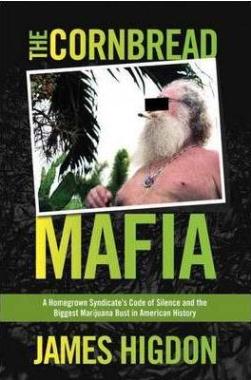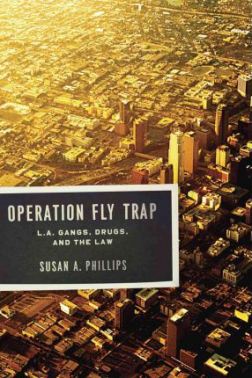Not one, but two states voted Tuesday to end marijuana prohibition. Initiatives passed in Colorado and Washington, but came up short in Oregon.
Here's the lowdown on a mixed bag of election results for drug-related state and local initiatives and public policy questions.
There have been victories before in drug policy reform, but what happened this week is different.
What do pot-growing Kentucky good ol' boys and crack-slinging South Central LA hustlers have in common? We review a pair of new books and make the connections.
The results were still coming in Tuesday night, but by a couple of hours after the polls had closed, medical marijuana was cruising to victory in Massachusetts. It will become the 18th medical marijuana state.
There was medical marijuana-related election news -- see our Chronicle coverage this week -- but the ongoing battles over medical marijuana also continued.
The Supreme Court wrestled with two drug dog questions Wednesday: Is a drug dog sniff of a house without a warrant a search under the Fourth Amendment, and are drug dogs reliable?
Three out of four BC residents in a new poll want to legalize marijuana, and there's more support for full-blown legalization than for the half-measure of decriminalization.
A young woman reportedly struggling with heroin addiction was shot and killed by undercover police under murky circumstances in West Valley, Utah, Friday afternoon. Her friends and family have questions.
Week after week, the beat goes on. Here's the latest on the bad cop front.
Colorado voters made history Tuesday night, passing a constitutional amendment to legalize, tax, and regulate marijuana and becoming the first state in the US to break with marijuana prohibition. Hours later, voters in Washington state followed suit, passing a legalization initiative there, but a similar effort in Oregon came up short.

Brian Vicente, Rob Kampia, and Steve Fox listen to Mason Tvert in Denver as Amendment 64 passes.
Even though marijuana legalization didn't achieve a
trifecta, two states have now decisively rejected marijuana prohibition, sending an electrifying message to the rest of the country and the world. Tuesday's election also saw a medical marijuana initiative pass in Massachusetts, a sentencing reform initiative pass in California, and a limited legalization initiative pass in Detroit. Medical marijuana initiatives failed in Arkansas and Montana.
[Editor's Note: Look for Chronicle news briefs soon on the election results we have yet to publish stories on.]
"The victories in Colorado and Washington are of historic significance not just for Americans but for all countries debating the future of marijuana prohibition in their own countries," said Ethan
Nadelmann, executive director of the
Drug Policy Alliance. "This is now a mainstream issue, with citizens more or less divided on the issue but increasingly inclined to favor responsible regulation of marijuana over costly and ineffective prohibitionist policies."
According to the
Colorado secretary of state's office,
Amendment 64 was leading comfortably with 55% of the vote, compared to 45% voting "no." But an early lead was enough for Amendment 64 supporters and foes alike to call the victory. Rising excitement at
Casselman's, the downtown Denver bar where campaign supporters gathered, turned to gleeful pandemonium as Colorado media began calling the result little more than two hours after the polls closed.
"Colorado voters have decided to take a more sensible approach to how we deal with marijuana in this state," said Mason
Tvert, director of the
Campaign to Regulate Marijuana Like Alcohol, which had brought together state marijuana reform groups such as
SAFER and
Sensible Colorado with national reform organizations such as the
Marijuana Policy Project,
Drug Policy Action, and
Law Enforcement Against Prohibition in a well-organized and well-funded winning campaign.
"Today, the people of Colorado have rejected the failed policy of marijuana prohibition," said Sensible Colorado's Brian Vicente. "Thanks to their votes, we will now reap the benefits of regulation. We will create new jobs, generation million of dollars in tax revenue, and allow law enforcement to focus on serious crimes. It would certainly be a travesty if the Obama administration used its power to impose marijuana prohibition upon a state whose people have declared, through the democratic process, that they want it to end."
"I'm so happy we not only did this, we did it right," said
MPP's Steve Fox, who had worked closely with
Tvert, Vicente, and Yes on 64 spokesperson Betty
Aldworth to bring the effort to fruition. "Now, it is legal in the state constitution to possess and grow marijuana. It can't be repealed on a whim; it is permanent. Thirty days from now, any veteran -- any person -- in this state can use marijuana."
"Colorado is the starting point, the tipping point, but it's not the end point," vowed
MPP executive director Rob
Kampia, who promised to take the effort to more states in the future.
Gov. John
Hickenlooper (D), a staunch opponent of Amendment 64, conceded its victory as well Tuesday night.
"The voters have spoken and we have to respect their will," he said in a statement. "This will be a complicated process, but we intend to follow through. That said, federal law still says marijuana is an illegal drug, so don't break out the
Cheetos or goldfish too quickly."
According to the
Washington secretary of state's office , as of 9:
28pm Pacific time Tuesday,
Initiative 502 was holding a comfortable lead of 55% to 45%. Sponsored by
New Approach Washington, the initiative had excited opposition among segments of the pot-smoker and medical marijuana communities, but created a carefully crafted and financially well-backed campaign featuring a series of establishment endorsers.

Betty Aldsworth thanks the voters of Colorado.
I-502 legalizes the possession of up to an ounce of marijuana by adults 21 and over, but does not allow for personal cultivation, except by or for medical marijuana patients. It will license marijuana cultivation and retail and wholesale sales, with restrictions on advertising. Regulation will be the remit of the state liquor control board, which will have to come up with rules by December 2013. The measure creates a 25% excise tax on marijuana sales, with 40% of revenues dedicated to the general fund and 60% dedicated to substance abuse prevention, research, and healthcare. It also creates a
per se driving under the influence standard of 5
nanograms of THC per milliliter of blood.
By contrast, Colorado's Amendment 64 allows adults 21 and over to possess up to an ounce of marijuana or six marijuana plants, three of which can be mature. It will create a system of state-licensed cultivation, manufacturing, and testing facilities and state-licensed retail stores. Local governments would have the option of regulating or prohibiting such facilities. The amendment also requires the state legislature to enact legislation governing industrial hemp cultivation, processing, and sale, and to create an excise tax on wholesale marijuana sales. The first $40 million of that annual revenue will be dedicated to building public schools.
"Marijuana policy reform remains an issue where the people lead and the politicians follow, but Washington state shows that many politicians are beginning to catch up," said
Nadelmann, noting that the Obama administration had failed to denounce the initiatives. "That bodes well, both states' prospects of implementing their new laws without undue federal interference."
In Oregon,
Measure 80, the Oregon Cannabis Tax Act (
OCTA), didn't fare so well. As of 11:
30pm Pacific time, it was losing 45% to 55%, with 69% of the vote counted.
It came late to the ballot compared to the efforts in Colorado and Washington, could not demonstrate majority support in polls, and, as a result, did not manage to attract substantial funding from outside donors, sealing its fate.
But despite the loss in Oregon, when it comes to passing groundbreaking marijuana legalization initiatives in the United States, two out of three ain't bad.
back to top
We've covered the two-out-three victories for the statewide marijuana legalization initiatives and we've covered the medical marijuana initiative victory in Massachusetts, but there was more going on as well. Here's the rundown on other drug policy-related issues that were on the ballot Tuesday. The results were definitely a mixed bag.
California Three-Strikes Sentencing Reform PassesCalifornia's Proposition 36 won easily, pulling 68.6% of the vote, according to semi-official results. (Final official results are due by December 7.) It will reform the state's three strikes law, which allows a life sentence for a third felony conviction and has resulted in people getting life sentences for drug possession, theft of a pizza, and similar trivial offenses.
The measure will allow life sentences only if the new felony conviction is "serious or violent," authorize re-sentencing for lifers if their third conviction is not "serious or violent" and if a judge determines their release would not pose an unreasonable risk to public safety, allow life sentences if the third conviction was for "certain non-serious, non-violent sex or drug offenses or involved firearm possession," and keep the life sentence for felons whose previous convictions were for rape, murder, or child molestation. Now, some 3,000 three strikes lifers could seek reductions.
Medical Marijuana -- Two Statewide Initiatives Lose
While Massachusetts voters made the Bay State the 18th medical marijuana state Tuesday, things didn't go as well in Arkansas and Montana.
Passage of Arkansas' Issue 5, the Arkansas Medical Marijuana Act, would have made it the first state in the south to embrace medical marijuana, but while it came achingly close, it was not to be. According to official figures with 64 out of 75 counties reporting Wednesday morning, Issue 5 was losing, 48.5% to 51.5%.
In Montana, medical marijuana advocates hoped to overturn the conservative legislature's gutting of the state's medical marijuana law with Initiative Referendum 124, which required voters to vote "yes" to endorse the legislature's changes. But according to official figures with about eight out of 10 precincts reporting Wednesday morning, the initiative won -- and medical marijuana lost -- by a margin of 56.5% to 43.5%.
Detroit Legalizes! And Other Michigan Local Initiatives Win
Michigan local initiatives ran the full spectrum of marijuana reform issues, with limited legalization on the ballot in Detroit and Flint, decriminalization on the ballot in Grand Rapids, making marijuana the lowest law enforcement priority on the ballot in Ypsilanti, and medical marijuana dispensary regulation on the ballot in Kalamazoo. They all won.
Detroit's Measure M, which legalizes the possession of up to an ounce on private property, won with 65% of the vote with 100% of precincts reporting, while the Flint measure was winning with 60% of the vote. Decriminalization in Grand Rapids also pulled 60%, while Kalamazoo embraced up to three dispensaries by a ratio of two-to-one, and Ypsilanti's lowest priority initiative won with a whopping 74%.
Massachusetts Local Questions Continue Perfect Record
For more than a decade, Massachusetts activists have used the tactic of the non-binding public policy question in legislative districts to demonstrate support for marijuana law reform. The questions have ranged from medical marijuana to decriminalization to legalization, and none have ever lost. This year, in districts representing one-fifth of the electorate, all the questions were about legalization, and again, they all won.
"Shall the State Senator/Representative from this district be instructed to vote in favor of legislation that would allow the state to regulate and tax marijuana in the same manner as alcohol?" -- won with 69% in the 2nd Middlesex Senate District, 71% in the Middlesex and Suffolk Senate District, and 72% in the 2nd Berkshire State Representative District.
"Shall the state Senator/Representative from this district be instructed to vote in favor of a resolution calling upon Congress to repeal the federal prohibition of marijuana so that states may regulate it as they choose?" -- won with 54% in the 22nd Middlesex State Representative District, 65% in the Essex and Middlesex Senate District, and 66% in 8th Essex State Representative District.
California -- San Diego County Towns Block Dispensary Regulation
[Editor's Note: We originally got these San Diego results backward, reporting that the initiatives had won.They didn't.]
According to semi-official San Diego county results, grass roots initiatives to permit and regulate medical marijuana dispensaries were voted down. Opponents won with 56% of the vote in Del Mar, 60% in Imperial Beach and Lemon Grove, 62% in, and 63% in Solana Beach.
Colorado -- Larimer County Dispensary Battles
Last year, Fort Collins residents voted to ban medical marijuana dispensaries, prompting advocates to put the issue back on the ballot this year. According to official Larimer County results, dispensaries will be back, winning 55% to 45%.
It was a different story in the town of Berthoud, where official results had the dispensary ordinance losing, 43% to 57%.
Of course, given the victory of Amendment 64, this could all be moot now.
back to top
What a week it's been.
Over 20 years in drug policy reform, I've seen victories before, I've seen the issue progress. But what happened this week is different. In fact I feel different.
There are huge challenges remaining, of course, even new ones. How will the federal government respond to legalization in Colorado and Washington? What will those states' officials do? Can we leverage our new political position to stop the federal war on medical marijuana? How to finally end the tragedies of mass arrests and incarceration that bad drug policies have fueled? And how to best encourage the growing international movement of leaders calling for alternatives to drug prohibition itself?
The coming weeks will see organizations and reformers thinking through their next steps -- for the movement as a whole, in our case for the movement's information wing and our targeted advocacy efforts. We'll be writing about it all here in
Drug War Chronicle and in the Speakeasy blog.
But we need your help, and so I'm writing today to ask your support for the next steps. Please support StoptheDrugWar.org with a generous donation in this time of great promise and change.
For those who donate $35 or more, we have three new membership premiums -- two books and a video -- that we'd be glad to send you ($65 or more for two items or $95 or more for all three). There are older items in our stock as well -- books, videos and StoptheDrugWar.org gift items -- some for as little as $15! All our inventory is now stored off-site at a fulfillment house, meaning we can send them to you within days of receiving your order.
Click here to read about the new gifts we're offering, and visit our donation page to read the full list.
At a time like this -- when people are talking about drug policy like never before -- the movement's internet strategy is also more important than ever before.
So please support our work with a generous donation by credit card or PayPal today. You can also donate by mail -- info below.
Lastly, please note that even with nonprofit, bulk discounts, we spend a significant amount to purchase these items and send them to you -- if you can afford to donate more than the minimum, or to supplement your donation with a continuing monthly contribution, I hope you'll consider doing so. If gift items are not important to you, I hope you'll consider sending a donation that's entirely for our work.
Donations to our organization can be made online at
http://stopthedrugwar.org/donate, or they can be mailed to:
DRCNet Foundation (tax-deductible), P.O. Box 18402, Washington, DC 20036; or Drug Reform Coordination Network (non-deductible for lobbying), same address. (Contact us for information if you wish to make a donation of stock.)
Thank you for making it possible for us to come this far. As the week's events show,
time, and the truth, are on our side!
Sincerely,

David Borden, Executive Director
StoptheDrugWar.org
Washington, DC
http://stopthedrugwar.org
back to top
Cornbread Mafia: A Homegrown Syndicate's Code of Silence and the Biggest Marijuana Bust in American History (2012, Lyons Press, 375 pp., $24.95 HB)
Operation Fly Trap: LA Gangs, Drugs, and the Law, by Susan Phillips (2012, University of Chicago Press, 174 pp., $18.00 PB)
It's a long way from the Bluegrass Country of central Kentucky to the
bungalowed ghettos of South Central Los Angeles, and it's an even greater distance culturally than geographically. In the first locale, the white descendants of Catholic distillers turned moonshiners tend their crops in hidden hollows, distrust of police by now second nature. In the second, the black descendants of post-World War II factory workers scramble to survive in a post-industrial landscape, slinging crack and dodging gang violence, with the police viewed as little more than an occupying force.
Cornbread Mafia and
Operation Fly Trap focus on two groups of people separated by time, race, and culture, but united by a common adversary: the repressive apparatus of the drug war.
Cornbread Mafia tells the story of some bad
ol' good
ol' boys who made Kentucky synonymous with top-grade domestic marijuana production in the '
80s and who generated the largest domestic grow op bust ever, while
Operation Fly Trap tells the story of a small group of LA cocaine suppliers and crack dealers in the early '
00s who were wrapped up and sentenced to lengthy prison sentences in a pioneering use of innovative policing and prosecutorial
strategems.
While both books critically address the interaction of groups of socially-defined criminals with a law enforcement complex grown up to feed off them, they feel and read quite differently.
Cornbread Mafia is written by a journalist with an intimate knowledge of Lebanon, Kentucky and surrounding Marion County, and it reads like a true crime thriller, full of hillbilly noir and great and crazy tales, except that unlike most of the genre, it is sympathetic to and gives voice to the deviant "others." It's the kind of dope tale you pick up and don't put down until you're done.
It centers on a 1987 Minnesota pot cultivation operation that was busted when an early snowfall killed the surrounding corn hiding it. Organized by Marion County grower and trafficker Johnny Boone, the massive Minnesota grow was the largest ever busted, and by the time the feds had unraveled things, some 70
Kentuckians had been indicted. Although not a one of them rolled over on his peers, many of them went away for long stretches, sentenced under new RICO laws designed to bring the pain to the backwoods pot scofflaws. Boone himself did 15 years.
But that bust and the indictments that followed -- much ballyhooed, of course, by back-patting DEA officials, federal prosecutors, and state law enforcement honchos -- were a long way down a road that wound back to those Prohibition era moonshiners -- Lebanon's location as hot spot on the
1950s and
1960s chitlin circuit, where black performers including a skinny guitarist named
Jimi Hendrix performed, and the return of reefer-exposed Vietnam War vets in the
1960s and
1970s.
I recall traveling to Washington, DC, to attend the annual
4th of July smoke-in in 1978. Before DC legends Root Boy Slim & the Sex Change Band played their set, a gangly man in a suit bearing a down home accent took to the stage, introduced himself as Kentucky lawyer and legalization advocate
Gatewood Galbraith, and threw large colas of weed into the crowd, yelling, "This is the real Kentucky Bluegrass!" I didn't have a clue then, learned about Galbraith and the Appalachian pot growing scene over the intervening years, but didn't really know the back story about the whole Kentucky scene. Now, thanks to
Cornbread Mafia, I feel like I do, and
Higdon tells it with grace and empathy.
It's a story that isn't over. Once Johnny Boone got out of federal prison, he couldn't help but return to his old ways. In 2008, he got busted growing 2,400 plants in a neighboring county. Facing life in federal prison as a three-striker, Boone vanished. The feds still haven't found him.
Operation Fly Trap, on the other hand, is written by an academic, published by an academic press, and reads like it. Granted, ethnographer Susan Phillips knows her stuff -- she spent years working in the neighborhood before even embarking on this project -- and she brings heart and passion to her writing, crafting a compelling and fascinating narrative, but it can still be heavy going at times. Still, even if sometimes wrapped a little too tightly in academic-speak, Phillips is exposing and addressing vital issues of race, class, and the structuring of criminality, and her critique is important and incisive.
Operation Fly Trap, a project of a multi-agency, state-federal joint task force aimed at gang suppression, drew its name from Tina Fly, the central figure in a crack cocaine operation in two Bloods-controlled South Central neighborhoods. Before it was done, it had wrapped up two dozen people from the tightly knit community, many from the same families, and sent them off to long federal prison sentences under anti-gang sentencing enhancements.
Like military commanders patting themselves on the back over the accuracy of their weapons, law enforcement and prosecutors congratulated themselves on the "precision" of their strike against the Tina Fly operation and the surgical removal of the cancer from the community.
But Phillips calls into question both the success of the operation and the means used to conduct it, and along the way, shines a bright light on the ways in which the impoverishment of communities like South Central and their ravaging by both criminals and those sent to catch them is a matter of public policy -- not merely personal pathology, the narrative offered up by all those men in suits at their press conferences.
Indeed, it is the situation that is pathological when the very criminals being hunted are the community's pillars, its breadwinners, and when their removal does not remove criminality, but enhances it. That pathology is only enhanced by the ongoing struggle between the community's criminals and the police, the use of snitches who sow mistrust and suspicion on the street, and by our refusal as a polity to do anything but keep reproducing those conditions that generate such predictable outcomes.
Phillips also documents how, as criticism of the mass incarceration of non-violent drug offenders grew ever louder, the use of anti-gang policing and prosecutions only intensified. "Operation Fly Trap was an attempt to make [mass incarceration] more palatable by recasting nonviolent drug offenders as intimately related to the lethal violence of gangs," she writes. Along with drug sentencing reform and new gang legislation, the Fly Trap task force "represented a need to re-present the drug war as healthy and justifiable."
It's worth noting that although the Fly Trap defendants were pursued under the banner of the war on gangs, they charges for which they were prosecuted were drug charges. And Operation Fly Trap was by no means unusual. In fact, Phillips notes, more than 5,000 gang investigations were mounted nationally between 2001 and 2010, resulting in 57,000 arrests and 23,000 convictions. With sentencing reforms having taken some of the bite out of the federal crack laws, the gang enhancements allow prosecutors to still hold the threat of decades of prison over the heads of those rounded up.
Cornbread Mafia and
Operation Fly Trap focus in on different episodes of our perpetual war against the criminality we create through drug prohibition. Both are exceptionally useful in providing what is too often missing in drug policy discussions: the broader context. Journalist
Higdon basically gives us a history of Marion County and situates those back woods pot criminals squarely within it, while ethnographer
Higdon lays out the stark landscape of black LA, emphasizes how public policy decisions have created that landscape, and shows how other public policy decisions -- around economic policy, education, access to health and mental health services, incarceration as a response to social problems -- have created a milieu where Operation Fly Trap can be recreated in perpetuity.
Read
Cornbread Mafia because it's a rollicking gas, but read
Operation Fly Trap, too, because it's an eye-opening, sobering look at the whole penalization industry we're created to deal with the unruly
underclasses we've created.
back to top
Massachusetts voters Tuesday supported a medical marijuana initiative there by a margin of nearly two-to-one, according to partial results Tuesday evening. With half the vote counted, Question 3 was winning handily by a margin of 63% to 37%. It maintained that same lead when all the votes were counted Wednesday.
Bay State voters' adoption of a medical marijuana program will make Massachusetts the
18th state to approve medical marijuana. It is also legal in the District of Columbia.
The measure would allow people suffering from a debilitating medical condition to use medical marijuana upon the recommendation of a doctor with whom they have a bona fide relationship. Patients could possess up to a 60-day supply -- what constitutes that supply will be determined by the Department of Health. The initiative would also set up a system of nonprofit medical marijuana cultivation and distribution centers.
Led by the
Committee for Compassionate Medicine, with help from the
ACLU of Massachusetts and the
Massachusetts Patient Advocacy Alliance, the Question 3 campaign was low-key, well-funded and tightly controlled. That strategy worked in the Bay State, despite late opposition from law enforcement, the medical profession, and political figures.
back to top
There was medical marijuana-related election news -- see our Chronicle coverage this week -- but the ongoing battles over medical marijuana also continued. Let's get to it:
California
Last Tuesday,
the DEA raided two San Bernardino dispensaries, seizing dozens of pounds of marijuana and edibles, but making no arrests except for one man arrested on an outstanding warrant. The two businesses, Alternative Solutions Patient Care and Advanced Healing Qualified Patients Association, had previously been warned by the DEA to shut down for violating federal law.
Last Wednesday,
a medical marijuana grower sued Shasta County over a raid in which deputies destroyed more than 200 marijuana plants she said were being grown legally for herself and several other patients. Esmeralda Sanchez Garcia alleges her civil rights were violated between August and October 2011 when deputies with the Shasta County Sheriff's Office and other county employees searched her property without warrants and then destroyed 203 plants, as well as unprocessed and processed marijuana, that she said were for medical use for her and several other patients. But her lawsuit will have to wait until criminal charges against her are resolved. She faces three felony counts of marijuana cultivation.
Also last Wednesday,
a hearing in the Harborside Health eviction case was postponed. A federal judge pushed the hearing back to Thursday, but that date is likely to change since
Harborside head Steve
DeAngelo is in Denver to address the National Cannabis Industry Association conference. The feds have threatened
Harborside's landlords with civil forfeiture if they continue to let the dispensary operate on their properties in San Jose and Oakland. The San Jose landlord is now trying to evict
Harborside to comply with the government's demand. If the judge overseeing the case allows the landlord to do that, it could give the government additional legal ammo for expanding its crackdown on dispensaries.
Also last Wednesday,
a Los Angeles dispensary sued the Justice Department and the DEA, claiming the federal agencies are blocking thousands of patients from a means of gaining access to their medicine. The No Grey Sky dispensary is seeking a temporary injunction against DOJ, DEA, and Attorney General Eric Holder, and argues that Holder is acting "in excess of the government's authority granted by the Controlled Substances Act" by threatening to shut it down. Federal agents raided No Grey Sky earlier this year.
Last Thursday,
a ban on outdoor cultivation went into effect in Roseville. In June, the city approved an ordinance that said medical marijuana patients must grow their pot indoors. A grace period until November 1 was established to give growers time to harvest any outdoor crop. The ordinance was enacted to allow residents to enjoy their property "without being subjected to odors and safety concerns associated with outdoor medical marijuana cultivation," according to the city.
Also last Thursday,
the US 9th Circuit Court of Appeals rejected a petition to re-hear arguments that medical marijuana is protected by the Americans with Disabilities Act. A three-judge panel had shot down the notion in May, and following that loss, the patients and their lawyers requested a re-hearing. Now, they've had it.
On Monday,
the Corte Madera city council voted to ban new dispensaries. The move came on a 4-1 vote and came as an existing moratorium on dispensaries was set to expire this week. Council members agreed that they would review their decision in June 2013; but the council rejected a recommendation from the town's Planning Commission to have the ban automatically sunset on Feb. 1, 2014.
Colorado
As of the end of October,
there were 266 licensed dispensaries in the state, according to the Medical Marijuana Enforcement Division. More than 200 more potential dispensaries are awaiting licensing by the division.
Last Thursday,
the state Court of Appeals rejected a dispensary's claim it should be allowed to stay open despite limits imposed by Jefferson County. Footprints Health and Wellness had opened a dispensary in the county in 2009 and was served with a zoning violation notice shortly thereafter. The court held that the Colorado law allowed local communities to set their own standards.
back to top
The US Supreme Court Wednesday heard oral arguments in a pair of cases out of Florida involving the use of drug sniffing dogs. One case is about whether it is legal to use drug dogs to sniff around the outside of homes without a warrant and the other is about how reliable the drug dogs actually are. The cases have the potential to either expand or restrict the use of drug dogs under Fourth Amendment jurisprudence.
The two cases are
Florida v. Joelis Jardines, in which
Jardines was arrested for marijuana cultivation after police without a search warrant brought a drug dog to his door, then returned with a search warrant after the drug dog alerted, and
Florida v. Clayton Harris, in which Harris was arrested on methamphetamine charges after a drug dog alerted on his vehicle, but was stopped again two months later in the same vehicle and the same drug dog alerted, but no drugs were found.
In both cases, the Florida Supreme Court held that the drug dog searches were illegal, in
Jardines because it was a warrantless search of a home and in Harris because it didn't find sufficient evidence of the drug dog's reliability. In both cases, the state of Florida appealed.
The
Jardines case raises the issue of whether homes are subject to a higher Fourth Amendment standard than automobiles in traffic, luggage being sniffed on a conveyer belt, or packages being sniffed at a package delivery service. The Supreme Court has upheld the warrantless use of drug dogs in those cases, but has been inclined to grant greater protections to the sanctity of the home, rejecting, for example, the use of thermal imaging equipment to detect marijuana grow operations.
Gregory
Garre, arguing for the state of Florida, ran into problems with some justices when he suggested that a drug dog sniff of a residence does not constitute a search under the law and thus no warrant is needed.
If that were the case, Justice Ruth Bader
Ginsburg replied, wouldn't police be able to just walk down the street with a drug dog in "a neighborhood that’s known to be a drug-dealing neighborhood, just go down the street, have the dog sniff in front of every door, or go into an apartment building? I gather that that is your position."
"Your Honor, they could do that,"
Garre said.
Justice Elena
Kagan also questioned
Garre's rationale that a drug dog sniff was somehow different from a technology that allowed police to see inside a home -- such as the thermal imaging the court had previously ruled against. If someone invented a "
Smell-o-matic" machine,
Kagan said, police would still need to get a warrant to use it to search the home.
Jardines' attorney, Howard
Blumberg, argued that the thermal imaging precedent applied to drug dogs at a home as well. Using a drug dog outside a house was cut from the same cloth, he said.
"I would submit that would basically be the same thing as a police officer walking up and down the street with a thermal imager that's turned on,"
Blumberg said.
Justice Anthony Kennedy, often a deciding vote on the closely divided court, challenged
Garre on his contention that people with contraband in their homes have no expectation of privacy.
"Don't ask me to write an opinion and say, 'Oh, we're dealing with contraband here, so we don't need to worry about expectation of privacy,'" Kennedy said.
But Kennedy was also reluctant to accept
Blumberg's argument that when police are trying to find something people are keeping secret, it amounts to a search under the meaning of the Fourth Amendment.
"To say our decisions establish that police action which reveals any detail an individual seeks to keep private is a search: that is just a sweeping proposition that in my view, at least, cannot be accepted in this case. I think it's just too sweeping and wrong,’" Kennedy said.
"I would add a few words to the end of that statement: Anything that an individual seeks to keep private in the home, and that's the difference,"
Blumberg replied.
In the Harris case, it was the reliability of drug dogs that was at issue.
"Dogs make mistakes. Dogs err," Harris's attorney, Glen Gifford told the justices. "Dogs get excited and will alert to things like tennis balls in trunks or animals, that sort of thing. There is no canine exception to the totality of the circumstances test for probable cause to conduct a warrantless search. If that is true, as it must be, any fact that bears on a dog's reliability as a detector of the presence of drugs comes within the purview of the courts."
Questions about the reliability of drug dogs have been on the rise in recent years. Last year, the
Chicago Tribune analyzed three years of data from suburban police departments and found that alerts from dogs during roadside encounters led to drugs or paraphernalia just 44% of the time, and only 27% of the time for Hispanic drivers.
Justice Sonia
Sotomayor cited an Australian study that found a drug dog only correctly identified drugs 12% of the time.
"I'm deeply troubled by a dog that alerts only 12% of the time," she said.
Garre responded that the study could be read differently, raising the number of correct alerts to as high as 70% -- if you included instances where the person the dog alerted to had used in been in contact with drug prior to the dog's alert.
And Justice Department attorney Joseph
Palmore, arguing in support of Florida's position, told justices they should not let questioning of the dogs' skills go too far.
"I think it's critical... that the courts not
constitutionalize dog training methodologies or hold mini-trials with expert witnesses on what makes for a successful dog training program," he said, citing the use of dogs in multiple search endeavors. "There are 32 K-9 teams in the field right now in New York and New Jersey looking for survivors of Hurricane Sandy. So, in situation after situation, the government has in a sense put its money where its mouth is, and it believes at an institutional level that these dogs are quite reliable."
The Supreme Court will decide the paired cases sometime next year.
back to top
Support for marijuana legalization in British Columbia has reached a whopping 75%, according to a new Angus Reid poll commissioned by Stop the Violence BC, a coalition of law enforcement officials, legal experts, medical and public health officials and academic experts concerned about the links between cannabis prohibition in British Columbia and the growth of organized crime and related violence in the province.
The poll surveyed 799 respondents in British Columbia. The results have a margin of error of +/- 3.5%.
The number supporting legalization is up six points over last year's Angus Reid poll, where 69% supported it. Meanwhile, opposition to legalization has declined from 24% last year to 21% this year.
The new poll also suggested a broad social acceptance of marijuana in Canada's westernmost province, which has been a hotbed of marijuana cultivation and culture for several decades now. Only 14% of those polled believe possession of a joint should lead to a criminal record, down six points from last year, and 74% would be comfortable living in a society where adult cannabis consumption was taxed and legally regulated under a public health framework, an increase of four percentage points from last year.
Strikingly, support for full legalization was higher than support for the half-measure of decriminalization. While 75% supported legalization, only 62% wanted decriminalization.
"From a scientific and public safety, making cannabis illegal has clearly been an expensive and harmful failure," said Dr. Evan Wood, founder of Stop the Violence BC and Canada Research Chair in Inner City Medicine at the University of British Columbia. "With 75% of British
Columbians supporting change, and the status quo contributing to increasing harms in BC communities, it is absolutely time for politicians to catch up with the public."
Stop the Violence BC has been pushing for the legalization and regulation of marijuana. Its members include four former BC attorneys general, four former Vancouver mayors, including Larry Campbell, and former West Vancouver police chief and Liberal member of the provincial legislature
Kash Heed.
The campaign is picking up steam. In September, the Union of BC Municipalities passed a resolution called for marijuana regulation, and last month, the Public Health Association of BC (
PHABC) endorsed regulation.
"From a public health perspective, we urgently need to research alternatives to our current approach to cannabis which has clearly failed to protect public health and has actually resulted in substantial individual and community harms,"
PHABC president Dr. Marjorie MacDonald said in a statement.
back to top
Undercover police officers in West Valley, Utah, shot and killed a relapsed heroin user in the parking lot of an apartment building last Friday afternoon. Police have yet to confirm that it was a drug investigation, but all signs point to it. Danielle Misha Willard, 21, becomes the 56th person to die in US domestic drug law enforcement operations so far this year.

Danielle Misha Willard (facebook.com)
Because police have been slow to release information, the circumstances of the killing remain somewhat murky. But according to
Fox 13 TV, police said two undercover officers were involved, and one received minor injuries, although not from gunfire. The officers were on the scene "trying to contact someone regarding an investigation, but the nature of that investigation hasn't been officially disclosed."
"We want to complete the investigation before any specific details are announced," said West Valley Police
Sgt. Mike Powell. "It's in our best interest and everyone's best interest to collect all details before any specific statement is made."
According to the Deseret News, a gray SUV belonging to Willard was parking in a parking stall and a red SUV was parked directly behind it. The driver's side of the red vehicle was wedged against the back of the gray SUV , in what appears to have been an effort to block it from leaving, but police said the red vehicle was not a police vehicle.
Willard's body was on the ground nearby. The front windshield of her vehicle had what appeared to be two bullet holes, and both the driver's side and the passenger's side windows also appeared to be shattered.
Police have not said if Willard was the subject of their investigation, whether there was an exchange of gunfire, or whether the young woman was armed.
Her mother, Melissa Kennedy, told Fox 13 Willard had been addicted to heroin and had gone to Salt Lake City to undergo drug treatment, but had recently relapsed.
"Danielle struggled with heroin, she tried many times to get away from it. She tried by herself. I went through with her for a couple weeks. She went through three facilities, the last one in Utah," said Kennedy, Danielle’s mother. It sounds like drugs were involved because undercover cops were there," she added.
While Willard may have been using heroin, she was not likely to have been armed, her mother said.
"My daughter has never carried a weapon in her life. She's about 100 pounds soaking wet," Kennedy said. "How can she be so scary that someone feels like they have to shoot her?"
Police said they would release more information Monday,
but failed to do so.
back to top
Week after week, the beat goes on. Here's the latest on the bad cop front. Let's get to it:
In Baltimore,
a Baltimore police detective was arrested last Thursday on charges he lied on a search warrant application to gain entry to a residence and then tried to obstruct an internal affairs investigation. Detective Adam
Lewellen, 30, "willfully and falsely made an oath to a District Court judge that falsely described an alleged controlled buy by a confidential informant and an investigation into a suspect" in order to obtain a search-and-seizure warrant for the home in March. That raid resulted in illegal weapons charges against the home owner, but those charges have had to be dropped.
In Baker, Louisiana,
a former Baker probation officer was arrested last Thursday allegedly accepting a $200 bribe from a former city employee who had to take a drug test because of an accident.
Peron McCastle, 50, was responsible for administering mandatory drug screens to city employees involved in traffic accidents while driving city vehicles. In August, 2010, a city employee backed a vehicle into a pole and had to take a drug test.
McCastle reported that the test was negative, but then told the employee he had actually failed the test and he wanted $200 to record the negative test result.
In Memphis,
a former Memphis police officer was sentenced last Wednesday to four years in federal prison after getting entangled in an FBI drug sting. Michael
Sinnock purchased 20 pain pills and two pounds of marijuana from an informant, and tried in vain to argue they were for his sick wife, not for distribution. He also escorted the informant as he trafficked duffel bags supposedly filled with 200 pounds of marijuana.
Sinnock, 37, copped to attempting to possess
hydrocodone with intent to distribute.
In Springfield, Massachusetts,
a former Holyoke police officer was sentenced last Thursday to 2 ½ years in state prison for dealing cocaine. Paul
Barkyoumb had pleaded guilty to three counts of cocaine distribution.
Barkyoumb was a narcotics detective when he was arrested in June 2011 after selling coke to a cooperating witness.
back to top












